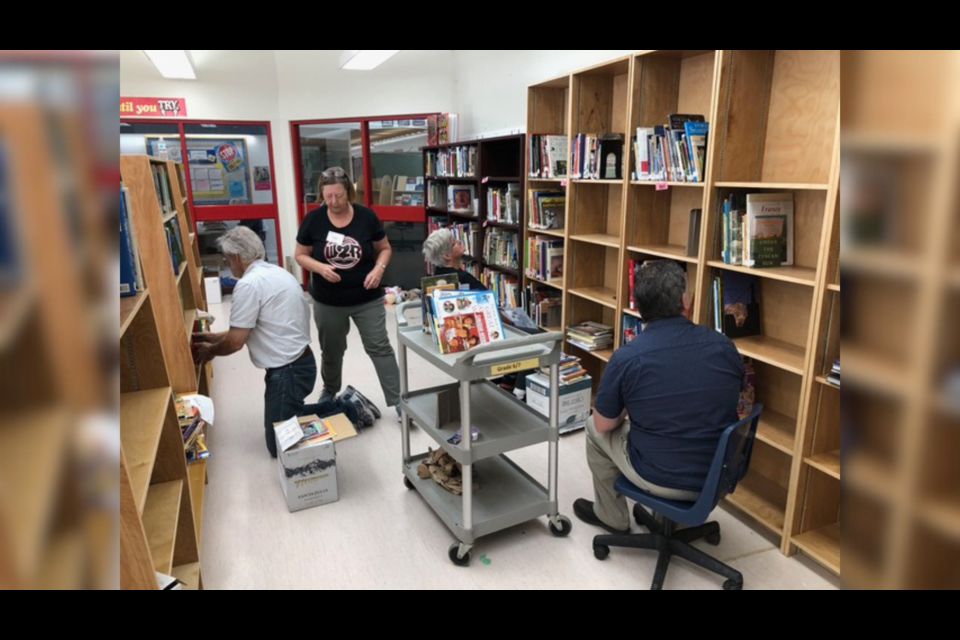A small team based in Steveston has spent more than a decade building libraries in Indigenous communities across B.C., and their sights are set on the B.C.-Yukon border for their 28th project.
"It's been one of the most rewarding... things that I've ever done with my life," said Bob Blacker, who founded Write to Read Project BC in 2011 with former Lieutenant Governor of B.C. Steven Point.
Write to Read is led by the Steveston Rotary Club and is dedicated to working with Indigenous communities to improve access to literacy materials and build bridges across cultures and communities.
The story of Write to Read, Blacker told the Richmond News, began in 2007 when he joined Point as an aide to camp for an event in Whistler.
Blacker, who was an incoming district governor for Rotary District 5040, was telling Point about the club's projects around the world.
"And then he asked me just one question that really actually stumped me. He said, 'What are you doing in your own backyard?'" Blacker recalled.
Point had served as a provincial court judge and the chief commissioner of the British Columbia Treaty Commission. After seeing First Nations and Indigenous people before him who were unable to read or write, he decided to take matters into his own hands.
"And he said, 'I want to get books into communities,' and I said, 'Oh, alright. Yeah, we could probably do that.'"
Libraries tailor-made to needs of each community
Blacker said he "didn't have a dang clue" where to start when they first started planning the project.
When he visited Indigenous communities with Point, he began learning about residential schools and the "travesty" of how the Canadian government treated the communities.
The focus of the project, he learned, should be to "listen."
"We ask, 'What would you like us to do?' And that was something for them to hear," he explained.
The project works with community champions to learn about the specific needs of a community, which are then incorporated into the library.
Some of these needs include computers, TVs and air conditioning.
While training is available for knowledge keepers and librarians and technical support is provided, how the libraries are operated is left entirely up to the communities.
One of the libraries is at a school in the Gitsegukla First Nation in the Skeena region. The principal reached out for help with redoing the library, which was "in tatters."
Despite an initial hiccup due to the COVID-19 pandemic, volunteers were able to go in and install shelving, books and bean bag chairs.
When it finally reopened, the library was a big hit with students who "streamed in" and went straight for the books.
Meanwhile in Bella Bella, the community library has become a popular destination along the Central Coast after the community added a coffee shop next door.
"Books and the smell of coffee... I don't know. Something goes together there," said Blacker.
People travelling on boats would pop by to use the computers and check out books, just to return them later on their way back.
"This is the first time (communities have) had something done that they have been involved with, that they have had input in this... The government can't touch it because (it) didn't give it to (the communities)," said Blacker.
"This is extremely special for our First Nations communities to have their own library as much as very much as pride for them."
Write To Read's 28th library, which will open later this summer in Lower Post just 20 kilometres south of Watson Lake, will be a fully indigenized library as requested by the community. The building, designed by local architect Scott Kemp, is built based on input from community members.
A grassroots operation bringing communities together
Write to Read is nothing short of a community effort, thanks to Blacker's Rotary contacts.
The project, which does not receive government funding, is run by Rotary club members and funded by donations.
It currently has around 70,000 books stored in lockers waiting to be installed in their new homes. The books, and the storage lockers, were all donated by local businesses.
Jeff Burnham, who owns Goodminds.com in Ontario, started by donating $3,500 in books. Now more than a decade later, GoodMinds is a major sponsor and donates $35,000, or around 1,500 to 1,700 brand new books to the project.
The storage lockers, on the other hand, were a donation from U-Luck Mini Storage in Surrey.
Since the first library was installed in Toosey, Britco has donated 13 modular buildings totalling more than half a million dollars.
The community effort doesn't stop here, however, as furniture and shelving at many of Write to Read's libraries are built by inmates at the Nanaimo Correctional Centre.
And who could forget Write to Read's "Library Response Team," led by four elderly women Blacker recruited to help set up the libraries?
"And we're still going. That's the most amazing thing here," said Blacker.
"Here we are, today, 13 years later, and it's a grassroots team of folks who say, 'Yeah, we'll help,' and a little Rotary club that keep on doing this."
Got an opinion on this story or any others in Richmond? Send us a letter or email your thoughts or story tips to [email protected].



